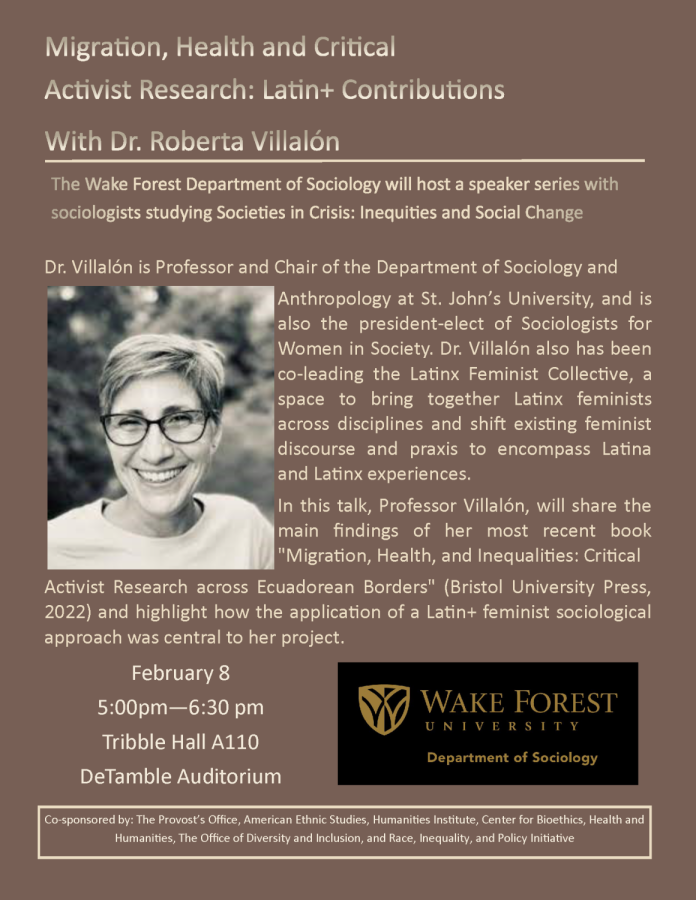Guest lecture explores health in Ecuadorean migrants
Dr. Roberta Villalón shares findings and narratives from her latest book
Dr. Roberta Villalón’s latest book explores the health of Ecuadorean migrants.
February 13, 2023
Dr. Roberta Villalón, a sociology professor at St. John’s University, visited Wake Forest on Feb. 8 to share with students the findings of her most recent book, “Migration, Health, and Inequalities: Critical Activist Research across Ecuadorian Borders.”
Early literature on health inequalities among immigrants has kept the effects of immigration and flawed medical care separate, according to Villalón, who mixes the perspectives to get a comprehensive view of the Ecuadorian migrant experience.
“We proposed a different perspective in hopes that we would change how people think altogether,” Villalón said.
Villalón herself is an Argentinian immigrant — as well as a Fulbright scholar and author of several books about the treatment of migrants from South American and Latin American countries.
“[Villalón’s] work demonstrates the potential of scholar-activism that brings change to communities,” said sociology professor Dr. Andrea Gómez Cervantes, who organized the talk. “[We] wanted to bring a Latina professor to campus because we simply do not have many Latin+ faculty, and I wanted to help Latin+ students connect with other Latina professors.”
Prior to writing her newest book, Villalón heard from health service providers in Loja, Ecuador, who were concerned that the needs of their patients were not being met after they or their families migrated to other countries. To answer their questions, Villalón’s research looked at how Ecuadorian migrations to the United States, Spain and back affected the physical and mental health of migrants and relatives who stayed behind.
Villalón conducted 40 in-depth interviews, hundreds of surveys, workshops and more from 2015 to 2019 to fully understand how Ecuadorians’ personal experiences factored into their physical health and how they were treated.
In short, her research revealed the complexities of the experience of migrants. The trauma that migrants endure due to factors like the separation of families, failed expectations, a prolonged need for perseverance and ever-changing border politics lead to stress and general deterioration that proves difficult to treat.
“They thought it was normal to have pain, and they didn’t do anything about it… it led to such unstable health conditions,” Villalón said.
In-depth interviews also revealed how migrants were able to persevere through such emotional and physical stress. The ability to visualize a sense of safety and the prospect of their families eventually benefiting from their experience as a migrant was a dominant factor in their perseverance.
Villalón hopes to educate whoever will listen about migrant experiences and ensure there are places to which migrants can turn when they are struggling against adversity.
Particularly at the time of her study, anti-immigrant sentiment was on the rise in the U.S. Under former President Donald Trump’s administration, legal immigration was cut in half. And with immigration policy being at the center of U.S. politics at the time, some Ecuadorian migrants’ stress was compounded.
It is important to know that the challenges of these groups are surpassed by [their] achievements.
— Dr. Roberta Villalón
“I hope that the U.S. government understands if you have any [unhealthy] group in your population, making them healthier will make everyone healthier,” Villalón said.
Nia Thompson, a junior and sociology major at Wake Forest, attended Villalón’s talk and shared her opinion.
“I liked it, and it was really insightful,” Thompson said. “It was relevant to class material, and I’m just personally interested as someone who focused on psychosocial research over the summer. It’s also always important to learn about issues you don’t know about, especially in today’s political climate.”
In her closing remarks, Villalón again expressed the significance of having empathy toward migrants in their high-stress situation and commended their ability to persevere
“It is important to know that the challenges of these groups are surpassed by [their] achievements,” Villalón said.























